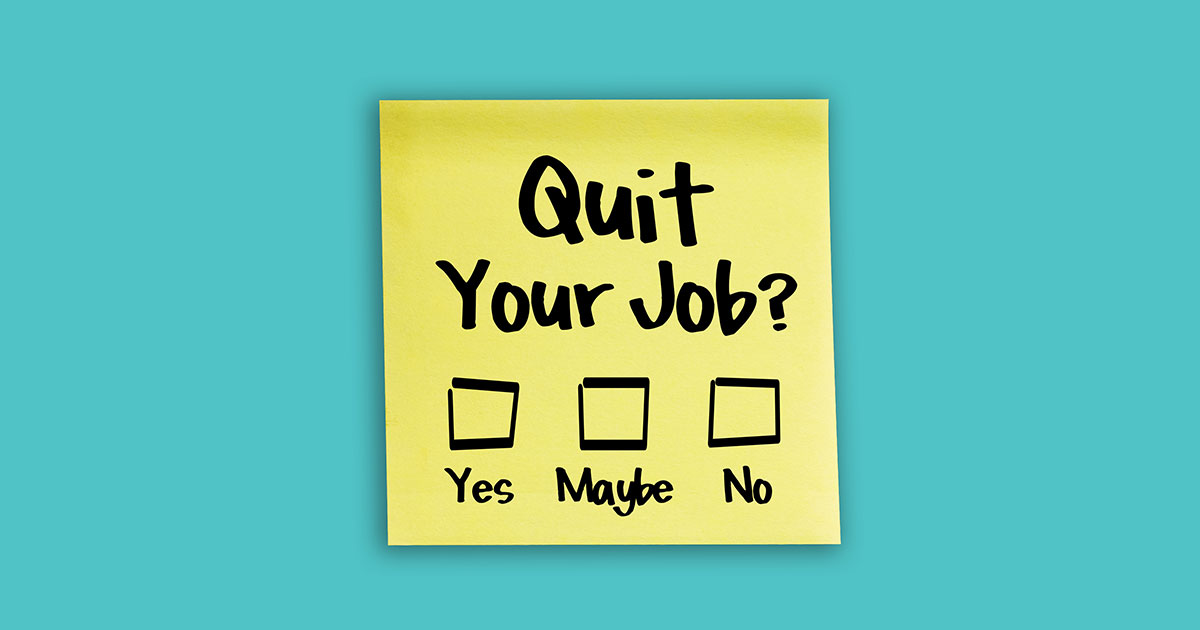Is Quiet Quitting Good?

What is Quiet Quitting?
For some, the notion of quiet quitting may feel like a clever turn of phrase for laziness. Or apathy. Or indifference.
But, is the lingering trend—of employees withdrawing from their jobs and only doing the minimum that is required of them—really a simple matter of people who don’t feel like working? Not so, says Jennifer Tosti-Kharas.
“I think there has been a narrative that it is only bad, that it is only a new problem of entitled employees,” says Tosti-Kharas, professor of organizational behavior at Babson College. “There is a vilification that they are losers not doing their jobs.”
In reality, says Tosti-Kharas, quiet quitting is not new, and workers who disengage from their jobs aren’t necessarily lazy or apathetic. Instead, they may be responding to the growing workloads expected of them and how unfulfilled their job makes them feel.
“I think it is a natural re-evaluation,” says Tosti-Kharas, also the Camilla Latino Spinelli Endowed Term Chair. “Is the nature and scope of the work employees are asked to do truly sustainable?”
Is Quiet Quitting Good?
Rather than thinking of quiet quitting as a negative, Tosti-Kharas says, both employers and employees alike should view it as an opportunity. After all, workers may have disengaged, but they are still employed and doing their jobs. They haven’t outright quit. So, what can be done to inspire them anew?
A renegotiation of an employee’s commitments and responsibilities could be in order. “Maybe this renegotiation needed to happen,” Tosti-Kharas says, “and maybe it needed to happen for a while now.”

Tosti-Kharas’ research explores career development and the meaning that people draw from their jobs. “We spend a lot of time at our work. Is it contributing to our lives in a positive way? That is a really important question,” she says. “In America, we have this notion that what you do is who you are. That means there is a lot on the line when we do work.”
That means that quiet quitting can be a significant issue in people’s lives. According to Gallup research, at least half of the American workforce is quiet quitting. Around the world, the number is close to 60 percent. “The numbers of quiet quitting—it is definitely striking,” Tosti-Kharas says.
Striking, yes, but that disengagement is certainly not a new phenomenon. “Of course, it is not a new thing,” Tosti-Kharas says. “As long as there has been work, there have been people not wanting to work.” Management theory has long shown that employees won’t go the extra mile unless given an incentive to do so. “Employees will not go above and beyond voluntarily unless they are given a financial incentive or a job that’s worth going the extra mile for,” she says.
The Waning of Hustle Culture
What is new, however, is that this passive quitting comes after years of the so-called hustle culture, which glorified an intense, all-consuming workplace ethos. “There was this notion that to be a good employee one was to be all-in, no matter the costs. We are all supposed to love our work and give our all to work,” Tosti-Kharas says. “What seems so radical about (quiet quitting) is that it is a contrast with the all-in at work mindset. Employees are saying I don’t want to do that.”
Today’s passive quitting also comes after the pandemic, which forced workers to confront the nature of their work and their lives. Time and what you do with it suddenly seemed a lot more important. “Am I spending time how I want? Am I being treated in a way that is fair?” Tosti-Kharas says. “When you are faced with a pandemic, you are acutely aware that you could go at any moment.”
That existential angst also helped fuel the Great Resignation, in which a torrent of workers left their jobs. For those employees, work had become unsustainable. In contrast, those who are quiet quitting haven’t left their positions, but that doesn’t mean they’re happy. “They are people wanting to get back some of the balance of what they are giving and what they are getting in return,” Tosti-Kharas says.
Fortunately, with time and effort, that balance can be restored.
Passive Quitting Doesn’t Mean Being Passive
To address quiet quitting, employers should first look to their managers, Tosti-Kharas says, and make sure they are still engaged themselves. “These are the people who are supposed to combat quiet quitting,” she says. “Are they having the conversations with employees that need to happen?”
Some employees who are passive quitting may genuinely like their jobs, but their responsibilities may have steadily increased over time to an overwhelming degree. Managers need to fix that. “People are asked to do more and more. Take a hard look at what is truly required,” Tosti-Kharas says. “Am I asking them to do their work or asking them to put in hours so I see them in the office? Is a deadline urgent or is it just my expectation?”
“There was this notion that to be a good employee one was to be all-in, no matter the costs. We are all supposed to love our work and give our all to work. What seems so radical about (quiet quitting) is that it is a contrast with the all-in at work mindset. Employees are saying I don’t want to do that.”
Professor Jennifer Tosti-Kharas
Managers should make sure to talk with all of their direct reports, some of whom may be unhappy but don’t feel quiet quitting is an option. “In some ways, quiet quitting is a luxury. Women and people of color are less likely to quiet quit because they don’t think they can,” Tosti-Kharas says. “Employers should be thinking about all employees, especially those who can’t speak up for themselves.”
Employees also should take action. Just because they’re passive quitting doesn’t mean they should be passive. If managers aren’t initiating tough conversations about workload, then employees should instead and advocate for themselves. The labor market still favors applicants in many industries, so that should give employees additional bargaining power. “You could find a receptive audience and that the job becomes sustainable,” Tosti-Kharas says.
If employees don’t find a receptive audience for their concerns, then perhaps that’s a sign that, instead of simply quiet quitting, they should outright quit and find something better. “Feeling like we are giving, giving, giving without getting anything in return—that is the seeds of burnout,” Tosti-Kharas says.






